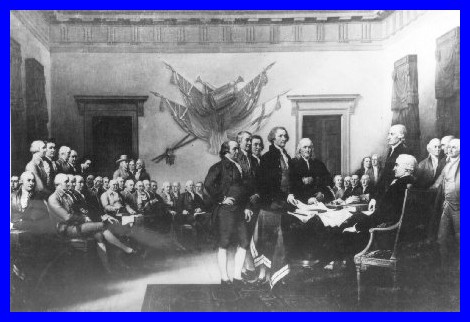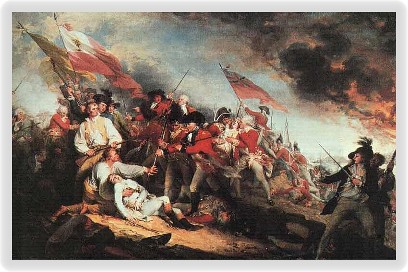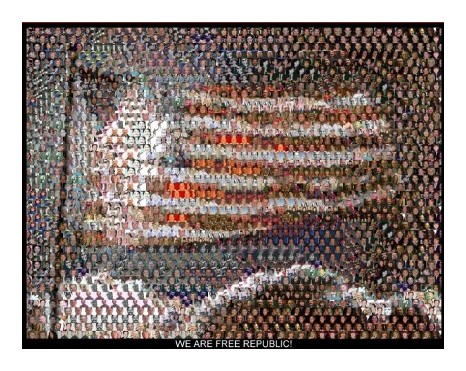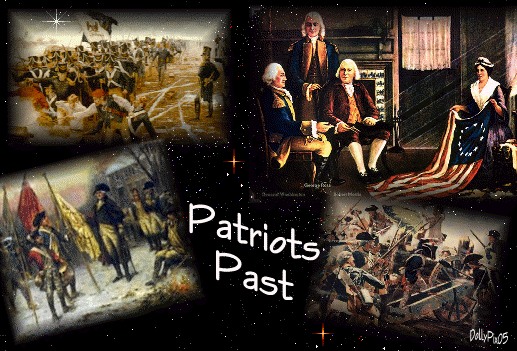 Historical Historical

The American War for independence
covered a period from 1763 to 1775.
Britain had 3 times more people than America, and considerably more wealth. The British also had a strong military with a powerful navy. At the start of the revolution, the American soldiers were poorly trained and had little military experience. Not all Americans were in favor of the rebellion. To the American's advantage, they were fighting on their own land and were experienced wilderness fighters from their battles with the native Indians. And equally important, George Washington turned out to be a brilliant leader.
There were many battles throughout the northern and the southern colonies. In defending themselves, the colonies knew they must act as a nation to survive. The war brought the colonies together with a single purpose, to defend their land and their freedoms.

The major events/battles of the Revolution were:
Battle of Lexington and Concord
Capture of Fort Ticonderoga
Battle of Bunker Hill
Olive Branch Petition
British Evacuation of Boston
Invasion of Quebec, Canada
Battle of Long Island
Battle of White Plains
Battle of Fort Washington
Washington crossing the Delaware River
Battle of Trenton
Battle of Princeton
Battle of Brandywine
Battle of Germantown
Battle of Bennington
Battle of Saratoga
Battle of Monmouth
Winter at Valley Forge
Battle of Savannah
Battle of Charleston
Battle of Camden
Battle of King's Mountain
Battle of Cowpens
Battle of Guilford
Battle of Eutaw Springs
Battle of Yorktown

The Declaration of Independence, unanimously declared
by the thirteen United States of America,
was adopted on July 4, 1776.

Those who signed the Declaration of Independence
JOHN HANCOCK, President
Attested, CHARLES THOMSON, Secretary
New Hampshire: JOSIAH BARTLETT, WILLIAM WHIPPLE, MATTHEW THORNTON
Massachusetts-Bay: SAMUEL ADAMS, JOHN ADAMS, ROBERT TREAT PAINE, ELBRIDGE GERRY
Rhode Island: STEPHEN HOPKINS, WILLIAM ELLERY
Connecticut: ROGER SHERMAN, SAMUEL HUNTINGTON, WILLIAM WILLIAMS, OLIVER WOLCOTT
Georgia: BUTTON GWINNETT, LYMAN HALL, GEO. WALTON
Maryland: SAMUEL CHASE, WILLIAM PACA, THOMAS STONE, CHARLES CARROLL OF CARROLLTON
Virginia: GEORGE WYTHE, RICHARD HENRY LEE, THOMAS JEFFERSON, BENJAMIN HARRISON, THOMAS NELSON, JR., FRANCIS LIGHTFOOT LEE, CARTER BRAXTON.
New York: WILLIAM FLOYD, PHILIP LIVINGSTON, FRANCIS LEWIS, LEWIS MORRIS
Pennsylvania: ROBERT MORRIS, BENJAMIN RUSH, BENJAMIN FRANKLIN, JOHN MORTON, GEORGE CLYMER, JAMES SMITH, GEORGE TAYLOR, JAMES WILSON, GEORGE ROSS
Delaware: CAESAR RODNEY, GEORGE READ, THOMAS M'KEAN
North Carolina: WILLIAM HOOPER, JOSEPH HEWES, JOHN PENN
South Carolina: EDWARD RUTLEDGE, THOMAS HEYWARD, JR., THOMAS LYNCH, JR., ARTHUR MIDDLETON
New Jersey: RICHARD STOCKTON, JOHN WITHERSPOON, FRANCIS HOPKINS, JOHN HART, ABRAHAM CLARK
PATRIOT'S DECLARATION
"One of the most essential branches of English liberty is the freedom of one's house. A man's house is his castle." --James Otis (1761)
"The Sun never shined on a cause of greater worth." ----Thomas Paine (1776)
"I am well aware of the Toil and Blood and Treasure, that it will cost Us to maintain this Declaration, and support and defend these States. Yet through all the Gloom I can see the Rays of ravishing Light and Glory. I can see that the End is more than worth all the Means. And that Posterity will tryumph in that Days Transaction, even altho We should rue it, which I trust in God We shall not." ----John Adams (1776)
"There is not a single instance in history in which civil liberty was lost, and religious liberty preserved entire. If therefore we yield up our temporal property, we at the same time deliver the conscience into bondage." ----John Witherspoon (1776)
"Our cause is noble; it is the cause of mankind!" ----George Washington (1779)
"The American war is over; but this far from being the case with the American revolution. On the contrary, nothing but the first act of the drama is closed. It remains yet to establish and perfect our new forms of government, and to prepare the principles, morals, and manners of our citizens for these forms of government after they are established and brought to perfection." ----Benjamin Rush (1786)
"[T]he flames kindled on the 4 of July 1776, have spread over too much of the globe to be extinguished by the feeble engines of despotism; on the contrary, they will consume these engines and all who work them. ... The Declaration of Independence...[is the] declaratory charter of our rights, and the rights of man." ----Thomas Jefferson (1821)
"On the distinctive principles of the Government ...of the U. States, the best guides are to be found in...The Declaration of Independence, as the fundamental Act of Union of these States." ----James Madison (1825)
"And it is no less true, that personal security and private property rest entirely upon the wisdom, the stability, and the integrity of the courts of justice." ----Joseph Story, Commentaries on the Constitution (1833)



Traditional

Parades, Picnics and Patriots.
Many common Fourth of July traditions today have their roots in the celebrations of the early republic. On July 25, 1776, citizens of Williamsburg, Virginia celebrated the colonists' victory with military parades and cannons firing. One year to the day after the signing of the Declaration of Independence, Philadelphians participated in a huge birthday bash complete with fireworks, parades, music and the firing of cannons.
The first official Fourth of July celebration, as affirmed by a legislative act, occurred in Massachusetts in 1781. By the mid 1800s, it became a United States custom to commemorate Independence Day in states and territories. Today, we use parades, picnics and fireworks to honor our country's fight for freedom.
Parades, which usually begin mid-morning, are the first tradition followed each Fourth of July. The small-town parade, with baseball teams, baton twirlers and the high school marching band, is a common sight in cities across the country. Our veterans and active duty military as well as local dignitaries participate in most events. Fathers hoist toddlers up on their shoulders for a clear view, while children munch popcorn and wave small flags. It's a fun, inspiring way to get into a patriotic mood.
After the parade it is picnic time, folks usually head home or to a relative's house for a family reunion or get-together. Although many families stay home and enjoy a relaxing day inside or in the backyard, it's also customary to spend the day at the beach or lake. Many public beaches have built in barbecues, so family and friends can enjoy hot barbecued ribs or chicken with fresh potato salad and sodas packed in the cooler. Softball games, volleyball, horseshoes, badminton, croquet…all bring back memories of years past and laughter & excitement
The most popular foods in a recent survey include: Hamburgers/Cheeseburgers,BBQ Ribs (Beef or Spare),Hot Dogs,BBQ Chicken,Cole Slaw/Potato salad,Baked Beans,Chips (various flavors) and Dip ,Pies (Cherry or Blueberry, but especially Apple),Corn on the Cob,Ice Cream (any flavor),Sliced Tomatoes.
Most popular beverages are: Beer Soda pop and tonic water Sangria (homemade or already made) Lemonade,Iced Tea (sun tea or traditional eabags)
When the parades are over and everyone's fingers are licked clean, the best is still yet to come—the fireworks display.
Fireworks are one of the oldest and most stunning ways to commemorate America's birthday. Frequently the nation's colors—red, white and blue—are used in these spectacular displays of patriotism. The sounds and display remininscent of the sights and sounds of the battlefield of years past.
The four primary effects of fireworks are noise, light, smoke and floating materials (such as confetti and other near-weightless objects). Taken alone or in combination with each other, they can create a vision and a sensation of utter electricity in a crowd of "oohers" and "aahers."
Firework RecordsThe world's largest firework was discharged on July 15, 1988 at the Lake Toya Firework Festival in Hokkaido, Japan. The Universe I Part II firework weighed 1,543 pounds and produced a light burst measuring 3/4 mile in diameter!
The world's longest firework display took place on February 20, 1988 in Johor Bahru, Malaysia. Including more than 3.3 million firecrackers and containing 1,468 pounds of gunpowder it burned for 9 hours and 27 minutes!
Firework Facts
A firework typically travels 3 to 7 seconds before bursting in the sky.
After bursting, it remains visible for 2 to 5 seconds.
A typical 10 to 12" firework will rise to as much as 1,300 feet before bursting
The basic ingredient in all fireworks, from the largest aerial shell to the smallest firecracker, is gunpowder, which is made up of:
75% saltpeter (potassium nitrate);
15% charcoal;
10% sulfur.
The colors come from the following materials
Red = strontium salts
Orange = calcium salts
Yellow = sodium salts
Green = barium salts
Blue = copper salts
Purple = strontium + copper salts
Silver = aluminum, titanium or magnesium
White = barium oxide or superheated magnesium or aluminum
![]() 
The Arts

Literature, paintings, poetry, Movies and now computer graphics. So many expressions of the time of the Revolution and birth of our country

The Death of General Warren at the Battle of Bunker's Hill (John Trumbull, 1786). Trumbull, an important painter of the American Revolution, witnessed the battle.
More Revolutionary War Art(and good historical review)

June 17, 1775, the Revolutionary War Battle of Bunker Hill took place near Boston. The battle, which actually occurred on Breed's Hill, was a costly victory for the British, who suffered heavy losses while dislodging the rebels.
Since we won that battle, as a gesture of goodwill, below is reproduced a poem from the Loyalist side:
THE AMERICAN TIMES
When Faction, pois'nous as the scorpion's sting,
Infects the people and insults the King;
When foul Sedition skulks no more concealed,
But grasps the sword and rushes to the field;
When Justice, Law, and Truth are in disgrace,
And Treason, Fraud, and Murder fill their place;
Smarting beneath accumulated woes,
Shall we not dare the tyrants to expose?
Bad are the Times, almost too bad to paint;
The whole head sickens, the whole heart is faint;
The State is rotten, rotten to the core,
'Tis all one bruize, one putrefying sore.
Hear thy indictment, Washington, at large;
Attend and listen to the solemn charge;
Thou hast supported an atrocious cause
Against thy King, thy Country, and the laws;
Committed perjury, encourag'd lies,
Forced conscience, broken the most sacred ties;
Myriads of wives and fathers at thy hand
Their slaughter'd husbands, slaughter'd sons demand;
That pastures hear no more the lowing kine,--
That towns are desolate, all -- all is thine.
I swear by Him, who rules the earth and sky,
The dread event shall equally apply;
That Clinton's warfare is the war of God,
And Washington shall feel the vengeful rod.
O! may that hour be soon! for pity's sake,
Genius of Britain, from thy slumber wake,
Too long has mercy spoke, but spoke in vain;
Let justice now in awful terror reign.
-- Jonathan Odell (1780)
Jonathan Odell was one of the best educated men in the colonies at the time of the Revolution. A physician turned Anglican minister turned writer, he was appointed chaplain of the First Battalion of Pennsylvania Loyalists, maintained close ties with the British high command, and was deeply involved in the treason of Benedict Arnold. Odell wrote many verses for the "Royal Gazzette" in the British stronghold of New York City. "The American Times" is one of his best known. His poems illustrates the anger loyalists felt toward their former neighbors as well as frustration with the British war effort.


Computer technology has permitted graphic artists such as Martin_Fierro to make images as the above: a composite of old glory made with the portraits of FReepers.

Cinema has wonderful images of some of the stories that emerged during the time of the birth of our nation. One of my favorites is The Patriot, a 2000 production with Mel Gibson starring as a widower and father of many children who reluctantly takes up the cause and heroically does his part to secure the revolution. Three other notable movies include: The Crossing, . The American Revolution , and 1776


 
 Commentary
Commentary

The Glorious Fourth
by Michael L. Bromley (copyright 2005). Freeper Nicollo is "Michael L. Bromley , a writer of political and social commentary and automotive history. He lives in Bethesda, Maryland."
Nicollo’s Profile Page
Nicollo’s Blog - Bromleyisms

On March 4, 1789, the United States Congress met for the first time under a new Constitution. Having been adopted the previous year with the consent of a ninth state, the document was far more than a political compact, a treaty between the sovereign states, or the forming of a nation. Its enormity, though, was simple enough: it was a container, a mere vessel to carry the ideas and the nation born on July 4, 1776.
When Lincoln sought refuge in first principle, he did not look to 1789. Those 87 years ago took him back to 1776. Part of it is that naming the Constitution’s founding date is a confusing exercise. Was it September 17, 1787, when George Washington adjourned the Philadelphia Convention? Was it 21 June of the next year when New Hampshire ratified it, or that 4th of March of 1789, or April 30 when the first President took the oath of office? The Constitution presents no moment of glory. Its formation was a long beginning of the what, at the end of the Revolution, Washington knew was to be the more hard work of making a functioning nation. The Constitution and its adoption was a technical and not an inspired, spontaneous event we might want for celebration. So we look to the “Glorious Fourth,” as they used to call it, for the national identity and birth.
The long, hard years of the Revolution, the two years’ wait for the Treaty of Paris and the two long months thereafter before British troops finally left New York, and the Confederation period throughout, marked little moment, and dragged out, and even lessened the meaning of the Fourth of July. (Indeed, outside of 1776, the greatest event of the period, larger than the War’s end itself, was Washington’s resignation from the Army.) Its importance was set by the later success of the nation. Nevertheless, the world was touched immediately by that July 4. Whatever Americans saw in it, the rest of the world could not ignore it. Some, even, acted upon it. First with the Marquis de LaFayette, whose “heart was enrolled in it” upon hearing the news (and whose fuller name demands repeating: Marie Joseph Paul Roch Yves-Gilbert du Motier, marquis de La Fayette), and next most importantly with the Baron Von Steuben’s arrival to America in February of 1778 (convinced to attend by Franklin and, supposedly, in the face of a pending sodomy charge in Prussia...), and the many others who arrived for the fight, be it out of ideal, like LaFayette, professional duty, as for Von Steuben, or for escape, for money, or for adventure, the American Revolution, from that magnificent, Glorious Fourth, escaped America itself, and became an event of man proper, one that belonged to all the world, and now to all the ages.
LaFayette’s story lands for a time, mangled by his birth country’s launch upon equality and liberty, victims of the intemperate, confused, and twisted French Revolution. LaFayette got it going. He alone had the guts to sign a petition -- at risk of his life and liberty just as had the signers of July 4 -- demanding in 1787 that the French King convene a new Estates General, the republican body abolished by the Loueys a century before. LaFayette authored the “Declaration of the Rights of Man,” which notably included the right to property, and was based upon Jefferson’s 4th of July. From there, LaFayette and his American ideals fell blow by blow to that great warning of the 20th century to come and the global rise of communism in the Commune, the Directory, and Napoleon. Histories of the French Revolution will mention and sometimes even detail the influence of the American Revolution upon France. Little connection, however, is made between those events of 1789 on either side of the Pond, the convocation of the new American government and Constitution, and the Estates General in France and its attempts at fundamental law -- that is, making good on the Fourth of July.
The example was hardly confined to France. England was forced again to accommodate 1776 in her own middle class revolts of the 1820s. All of Europe variously erupted in cries for liberty and equality throughout the 19th century, whatever the twist or bastardization in its application. And, of course, Latin America, too, took to 1776. One of those first attempts against Colonial rule you may not know. It came of an odd fellow, a versatile, middle class son of the Enlightenment who practiced the various arts of politics, science, medicine and war, Joaquim Josê da Silva Xavier, popularly known as “Tiradentes” for that one of his talents in dentistry. From far away Vila Rica, then the largest city in Brazil, and one of the largest in all the Americas, Tiradentes found such inspiration in the new American Constitution. He didn’t get far, and was strung up, quartered, and displayed in his various parts as to the destination of revolutionaries. No matter, in history, anyway, for Tiradentes is today a Brazilian hero, revered for his martyrdom to Brazil’s ultimate independence. (Unknown to your author is whether or not Brazilians, especially the current leader, Lula, he another of the solo-named Brazilians --a tradition that may or may not have commenced with Tiradentes -- appreciate that Tiradentes fought not against Portuguese rule so much as against its arbitrary rule and, most importantly, its high taxes.)
Individuals and nations across the time since have pursued those dangerous, radical ideas of 1776 and their messy but crucial embodiment in fundamental law. From our view in America, we can only hope they’ll finally get it, and not get away from it, as they have all too often. The best attempts remain so frustratingly near. I cringe and hold my arms across my heart to think of them: East Berlin in 1953, spitting upon Soviet rule, then crushed by it. Poland in ‘56, advancing, by inches, the cause, and, animated by it, Hungary, more violent in defiance and so violently destroyed. Czechoslovakia a decade later, crushed, too, while America, who inspired the fight, and tied up by nuclear bombs, did nothing. I cringe, too, so bad, at last week’s elections in Iran. Our ideas -- 1776 -- gave many there hope. Instead, a fool, an enemy of July 4 won. Why he won is our doing, too. He won because we empowered him in hating us, in hating and defying the Spirit of ‘76. But know this: even the Iranian Mullahs have to speak the language of July 4, and hold elections.
When in 1849, with Russian help, the Austrian crown fell upon an earlier, upstarted Hungarian independence, it was an oppression of the same of a century later. Then, the chief annoyance was Louis Kossuth, a minor noble, and a lawyer who knew and loved the American example. In him Americans first saw the force of their ideas abroad. Kossuth told them
, "I believe your glorious country should everywhere freely unfurl the star-spangled banner of liberty with all its congenial principles... Your glorious declaration of independence proclaims the right of every nation to assume among the powers of the earth the separate and equal station to which the laws of nature and nature’s God entitle them."
Hungary’s independence lasted but a year, and Kossuth fled, ultimately landing in America to find common cause and, he hoped, American help for a free Hungary. Brilliant and charming, Kossuth brought Americans to tears, and nearly to his cause. England received Kossuth first, and celebrated him, although, for England he was a geopolitical tool for protesting Austria and Russia, not a political ideal. For Americans, he meant something, as he showed them, in themselves. A hero of 1812, Jackson’s Secretary of War, and then Senator from Michigan, Lewis Cass, was moved to declare America’s culpability in the Kossuth story:
"And now the world-renowned exile is coming to us. The expatriated leader is seeking refuge in the New World from the injustice and oppression of the Old. At once the champion and the representative of a glorious cause- the cause of Human Freedom -- he has a right to our esteem and affection, and such manifestations of popular favor as will convince both the oppressor and the oppressed that wherever a nation is struggling for freedom, the hearts and hopes of the American people are with it in the effort. May the land of Washington ever be the asylum of the exiled patriot, who, less fortunate than Washington, but like him, devoted to his country, is doomed to abandon it, and to seek safety among strangers from the vengeance of arbitrary power. And in this spirit may the great Republic welcome her guest, and testify her respect for him, and her hope that he may ere long return to his beloved Hungary, to enjoy the gratitude and confidence of a free and happy people."
At a dinner in New York in December of 1851, at which the Cass letter, and others from Clay, Webster, Seward, and more were read, Kossuth pleaded for American intervention. Your example -- you -- he said, must again save us as you already have. But for your Constitution, but for your Day of Independence, Hungary’s own means little. Washington’s great admonition against foreign involvement, Kossuth pleaded, was annulled by Washington’s own acts. In creating America, in saving America, Washington created and saved the world, which you, his descendants, must now fulfill.
Those diners, and on through Kossuth’s tour, loved the flattery -- and ignored the kiss. For them, the conclusion of America’s means and ways was for America alone -- in concept, anyway. The world was easy to ignore. As America sorted out its domestic problems, she saw but herself in the mirror. Self-reflection and other such effects were brought upon her by Kossuth. If he was nothing for America, they had to ask, what did such a man mean for France, England, and Spain, and their colonies? In the Americas, especially, the weight of Kossuth fell upon Spain. During his tour of America, England swore herself to Cuba and its governor, Spain, against any “aggression on the part of the American Government.” Spurred by Kossuth, the fear was real. Still, not for another fifty years would America really consider it, and even then reluctantly. When it finally came, it was 1776 that made her do it.
Forget geopolitics. Forget Britain and Spain, and the Monroe Doctrine. Cuba’s entreaty for American intervention was the same as that of Kossuth a half century before. We want your ideas, yes, but, more, your ideas command you to help us. America didn’t go blindly or unwittingly into the Spanish American War -- taught by history as the inaugural of American Imperialism, the way of the Twentieth Century. Where later on, Communism looked to spread, and conveniently found excuse and opportunity, America of the late 19th century tripped and fell into the world without knowing quite why. Yes, many Americans demanded the War in Cuba, but just as importantly so many resisted it. A major party ran two candidacies against it. A Speaker of the House lost his position over opposition to it against his own party. The President himself prayed for guidance before launching it. It was as politically divisive as any war the moderns might imagine, or want. (How today’s dissent-junkies would have loved to hate the Spanish-American War-- especially its aftermath and the long, hard fought peace.) Whatever God’s reply to McKinley, the President’s reluctance was less than his resolve, which was more powerful for his reluctance. He had no say in purpose, for he inherited that from LaFayette, Von Steuben and Kossuth. McKinley prosecuted the war, and gave it meaning, precisely for his hesitation going into it. When he asked Judge Taft to head the civil government in the Philippines, now taken from Spain, Taft replied that he couldn’t take the position for he didn’t believe in the war. That was, McKinley replied, exactly why he wanted Taft for it.
It was no simple thing, this applying America abroad. For McKinley and Taft, the Philippines were a very test of democracy. Paternalism and imperialism were not in the design. Instead, it was, Taft said, a “great experimental laboratory of practical government.” From Manilla Taft wrote home asking for “upright” and experienced lawyers who spoke some Spanish, and by whose “example these people [will] know what Anglo-Saxon justice means.” If in self-governance, the law comes of the consent of the governed, he reasoned, then the governed must be capable of making and living by the law. Taft’s job was no less than recreating the great object of 1789, in putting July 4 into action in that little, backward, and brand new nation. If imperialism, it was the most unusual sort. America’s self-interest lay in the self-interest of the occupied lands. As he said in Cuba in 1906 during a brief intervention there, Taft looked upon the American occupation as a “receivership.” This was not paternalism; it was responsibility. “We are here against our will,” he explained, “and only for the purpose of aiding Cuba.”
I trust this sounds familiar to 2005. The Philippines and Cuba were not the unmitigated success McKinley, Roosevelt and Taft hoped. In 1913, a Democratic President, Woodrow Wilson and his relativist, feel-good Secretary of State, William Jennings Bryan, reversed these policies under the guise of anti-imperialism. The Filipinos were cast unto themselves, and Cuba and Mexico were left to their own, bad courses, free of those impossible but world-making demands of the example of America that McKinley wished upon them. But it was not a lost wish. In 1946, starting over after World War II, the Filipino government chose July 4 to declare itself newly free. The ideals of 1776 remain in today’s lost Cuba, too, for Castro exists by, for and of anti-Americanism. He is a creature of opposition alone.
July 4, 1776 is and always will be America’s greatest export. Made for domestic consumption, its demand was immediate and worldwide. As Kossuth explained in 1851,
"The very existence of your great country, the principles upon which it is founded, its geographical position, its present state of civilization, and all its moral and material interests, would lead on your people not only to maintain, but incessantly more and more to develope [sic], your intercourse with the world."
“Moral and material interests” -- what a fantastic way to call the imperative of 1776! Wishing it for his own people, Kossuth begged his American audience to keep it true for themselves:
"And as to your glorious Constitution, all humanity can only wish, in the common interest of mankind, that you and your posterity may yet long conserve this religious attachment to its fundamental principles, which by no means exclude development and progress; and that every citizen of your great Union, thankfully acknowledging the immense benefits of this Constitution, may, even in the moments of the most passionate irritation, never forget to love that Constitution more than the momentary passion of his heart, or the egotistical interest of the passing hour."
So many errors, so many problems across the time and ongoing experiment of America, and so many practicing that disbelief Kossuth feared. Yet, whatever our self-loathing, it comes of the demands our Fathers made upon us. It was a cruel thing, this, to give us freedom and self-government, and we have tried and keep trying to ruin it. It is so demanding, so unrelenting, so thoroughly right that even we today can’t screw up enough to kill it. It guides us, it makes us, and it is us and all that we do. We might see the end in the last or the next election, court decision, regulation, tax, or global event. If we didn’t want 1776 so badly, we wouldn’t care, and for it we carry on the fight, in the ongoing process of making the nation, launched in 1789. For me a saddest day was when little Elian was returned to Castro’s Cuba -- McKinley betrayed, and Lady Liberty lowered her torch. It was just one kid, good friends told me, and his father ought to have him. I’ll remember it always, and cry. But I cry not just for what Elian lost, but for what we could have had in him in the affirmation of America. These are tears of resolve and faith. So, dear Kossuth, we yet believe in our fundamental principles. We stray, yes, but we believe, and we are hard on ourselves for it.
Oh glorious Fourth of July, 1776, by which all things of man’s realm are ever since measured.





From all of us to all of you, our Finest FReeper FRiends, we wish for you a joyous and safe holiday week-end. This thread will be here all weekend and Monday for the Fourth of July holiday for those who might be in town and want to drop in from time to time. Please share you favorite holiday memory and your favorite graphics. Your Finest hostess crew: Dolly Cali, Billie, Dutchess; Mama_bear; and Aquamarine.
|
|
|
|







